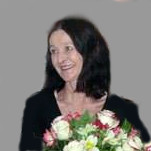Iryna Yakovlevna Kyrylina (born March 25, 1953 – died September 4, 2017) was a talented Ukrainian composer. She was born in Dresden, Germany. Iryna studied music at the Kyiv Musical College and later at the Kyiv Conservatory, finishing her studies in 1977. After graduating, she taught at a music school in Kyiv and led children's choirs. From 1982 onwards, she focused entirely on composing music.
Awards and Achievements
Iryna Kyrylina received many important awards for her musical work. These honors show how much her music was appreciated:
- She won the Ukrainian Republican Komsomol M.Ostrovsky Prize in 1988.
- She was recognized as an "Honored in Arts of Ukraine" in 1999, which is a special title for artists.
- She also won the Ukrainian President’s Prize in 1999.
- In 1988, she earned First Prize at an International Puppet-Show Competition.
- Her work was recognized at the International Children’s Festival multiple times, from 1993 to 1997.
- Her songs were featured at the All-Ukrainian Radio Festival "Song of the Year" from 1998 to 2001.
Her Musical Creations
Iryna Kyrylina was one of the first Ukrainian composers to create "song cycles" for voice and orchestra. A song cycle is a group of songs that are connected by a story or theme. She also wrote music for plays and shows. Often, she would include traditional Ukrainian songs in her compositions, blending old and new sounds.
Here are some of her notable works:
- Chamber Cantata no.1 ‘Iz zvyozdnogo kovsha’ (From the Starry Ladle) (1977): This piece was for a soprano singer and a small group of musicians.
- Sonata (1980): A piece for violin and piano.
- Chamber Cantata no.3 ‘Znaki pamyati’ (Signs of Memory) (1986): Written for a soprano and a small orchestra.
- Sinfonietta (1987): A short symphony for 13 string instruments.
- Chamber Cantata no.4 ‘Memoria’ (1988): Another piece for soprano and a small group of musicians.
- 3 portreta (3 Portraits) (1988): A short opera for a mezzo-soprano singer and a small orchestra.
- Chamber Cantata no.5 ‘Molitva’ (Prayer) (1989): For soprano, choir, and orchestra, using traditional religious texts.
- Bagatelles (1990): Short, light pieces for piano.
- Sax Quartet (1990): Music for four saxophone players.
- Raspad (Disintegration) (1991): A chamber symphony.
- Chamber Cantata no.6 ‘Kuznechik’ (The Grasshopper) (1992): For soprano, clarinet, violin, and piano.
- Rozmyte bachene (What I have Seen has been Washed Away) (1993): A cantata for children's choir, male choir, and organ.







